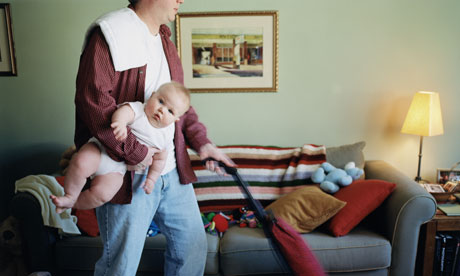
It will be music to the ears of working mothers everywhere: fathers are happier when they do more of the housework themselves, spend longer with their children and have working partners who are in the office just as long as they are, a major new study has found.
The best way to de-stress a father is for his partner to share the weight of domestic burdens with him, rather than ironing his socks, making his breakfast and taking the lion's share of responsibility for the kids.
Researchers hope the interim findings from the study, called Work Life Balance: Working for Fathers?, will prompt employers to re-evaluate myths about work – so that women cease to have their careers blocked by bosses who assume they will be primary carers of children, and men are given more opportunity to change their work-life balance.
"The way we 'do' family has changed – not only because mothers are more likely to go out to work but also because today both mothers and fathers want close relationships with children as they are growing up," said Dr Caroline Gatrell of the Lancaster University management school, the lead researcher in the two-year project carried out for the charity Working Families.
Gatrell and her team spoke to more than 1,100 working fathers to find out how they combine work and family life. Their findings reveal that the desire for more "family time" is widespread, with 82% of full-time working men saying they would like this.
"It is becoming increasingly evident that the expectations that fathers have of the way and amount they are involved directly with their children is altering. Fathers want to spend more time with their children and are doing more of the direct care for them," said Gatrell.
The team also found evidence that social attitudes towards childcare are in a period of profound change: fewer fathers than mothers, for example, believe that it is a mother's job to look after children. "The problem is that although families are changing, this is – largely – being completely ignored by employers," added Gatrell.
"This is creating a massive problem for both men and women. Women are having their careers blocked by employers who assume that, once children come along, their commitment to the workplace will be severely compromised. But the same myth is also disadvantaging men who find themselves being their child's main or only carer, because employers aren't offering them work-life balance choices. It is time workplace attitudes changed to recognise the massive changes that have taken place in family practices in the 21st century."
The findings also include that men are very often "seriously stressed" and those who have one or three children are more stressed than those who have two; fathers who do more housework are less stressed than those who do a smaller amount; and fathers whose partners work full-time have a better sense of wellbeing than those whose partners work part-time.
"New fathers are likely to be completely unprepared for the impact a child has on their lives. When number two comes along, they know what to expect. But number three is another massive change, especially with the extra squeeze on income and costs," said Gatrell.
She added that, even though there is an "equalling up" in the domestic sphere, women still do most of the domestic work and childcare, partly because fathers are "hitting some limits" in the time they have for work and family.
"Although fathers have expressed a desire to work more flexibly, they do not do so in the same numbers as women."
A modern father writes...
Two kids. Tick. I certainly never wanted any more. I was a third child and my wife and I couldn't take a chance on another me. Besides, two kids seemed to use up every emotional and financial reserve.
Working wife. Tick. I'd never considered the idea my wife wouldn't work. Neither had she. We wouldn't have had enough money to eat if we'd had to rely on what I was earning when our first child was born 18 years ago. And by the time I was making enough to support the family, the kids wouldn't have wanted my wife at home micromanaging their lives. Enough said. More than enough.
Helping with the housework. Tick. Between you and me, I'd quite like to be able not to tick this one. I rather fancy the idea of being waited on hand and foot, with all my meals cooked and washed up, my clothes washed and no arguments over what we're watching on TV. But staff are very expensive these days and my wife is no pushover. So, even though I've been turning whites into greys for as long as I can remember I still haven't managed to get out of doing most of the washing and I'm no stranger in the kitchen.
Entirely by accident, I seem to have stumbled on the recipe for happiness. Though I'm not sure if happy is the first word my wife or children – or anyone else for that matter – would use to describe me. Happy is far too stable a word. It speaks of consistency and optimism, both of which I only ever experience fleetingly. Grumpy. That sounds a bit closer. Neurotic, high maintenance, insomniac. Now we're getting somewhere.
There again … My wife, kids, home, job: I wouldn't change a thing. Except more cash. That would be nice.
John Crace

